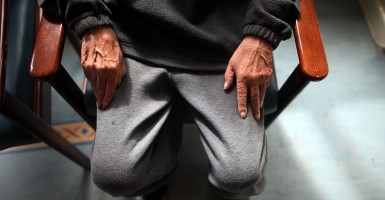Patients at a Veterans Affairs hospital have been going without toothbrushes, toothpaste, pajamas, sheets and blankets while department officials spend money on new Canadian-made furniture, televisions to run public service announcements and solar panels.
Sources inside the Shreveport, La., hospital say patients have had to contend with substandard care, as many nurses spend less time on work than on cell phones, iPods or accessing personal data on hospital computers.
“It shouldn’t be like this. These are our veterans,” one employee said. “When I saw those solar panels out there and they waste money on things like new TVs that just play [public service] announcements, it really made me angry.”
According to the VA, the department spent $74,412 on 24 flat screen TVs for “patient/employee information.” The furniture cost $134,082 and the solar project was approximately $3 million.
Shreveport’s Overton Brooks VA Medical Center was built in 1950. Sheets and blankets often have holes or are threadbare. Pajamas are missing buttons or snaps and are ripped. But patients who get even these items are lucky.
By the weekend, the hospital runs out while awaiting its supply of laundry to arrive from 125 miles away, where it was cleaned at another VA hospital in Pineville, La.
The VA said it doesn’t contract with a local vendor because the employees in Pineville are veterans, but it did not address why it would spend $3 million on solar panels to help the environment yet condone burning millions of gallons of gasoline.
“The patients don’t complain, they are wonderful,” the employee said regarding the lack of resources. “They are so appreciative of the care. That’s the least of their problems, these ratty, torn pajamas.”
The VA said in a statement that laundry is inspected before it is delivered. To this, the employee laughed in amazement.
“I can’t tell you how many times a blanket will be opened and there will still be the electrode pads stuck to it from the last patient,” he said. “And the pajamas still have tape on them from the last person’s IV.”
























